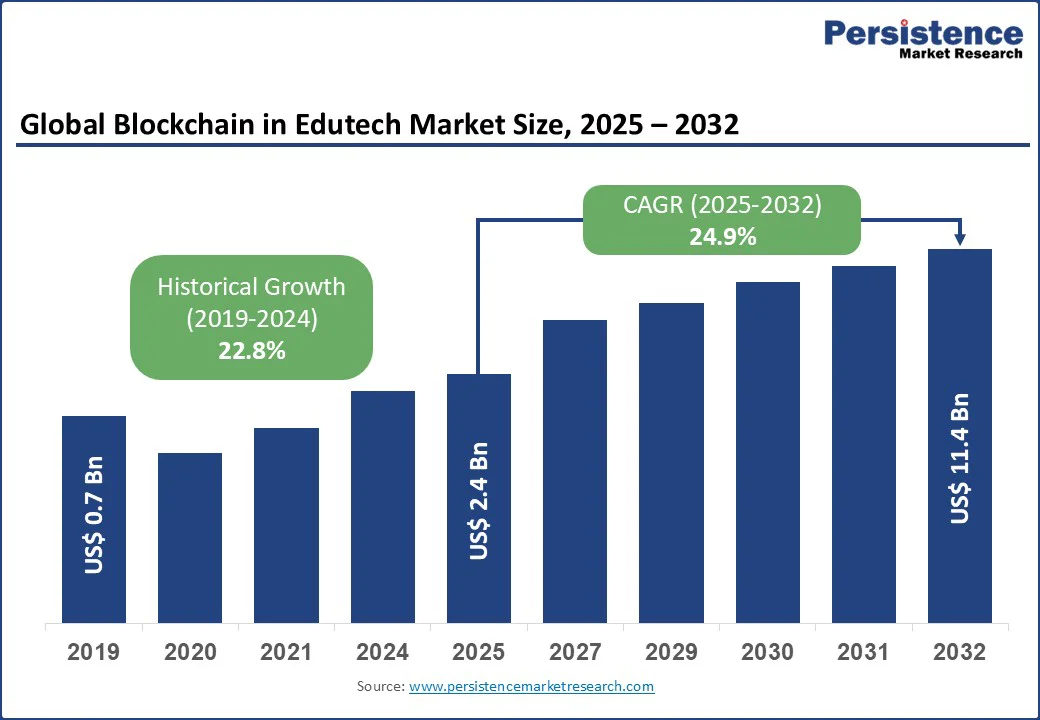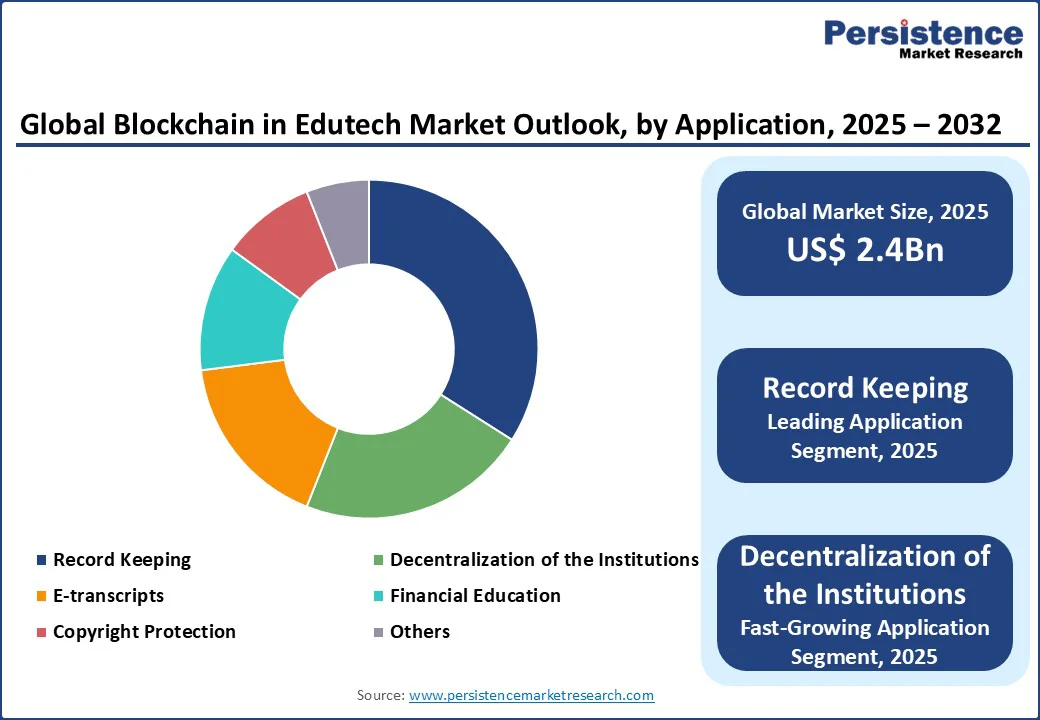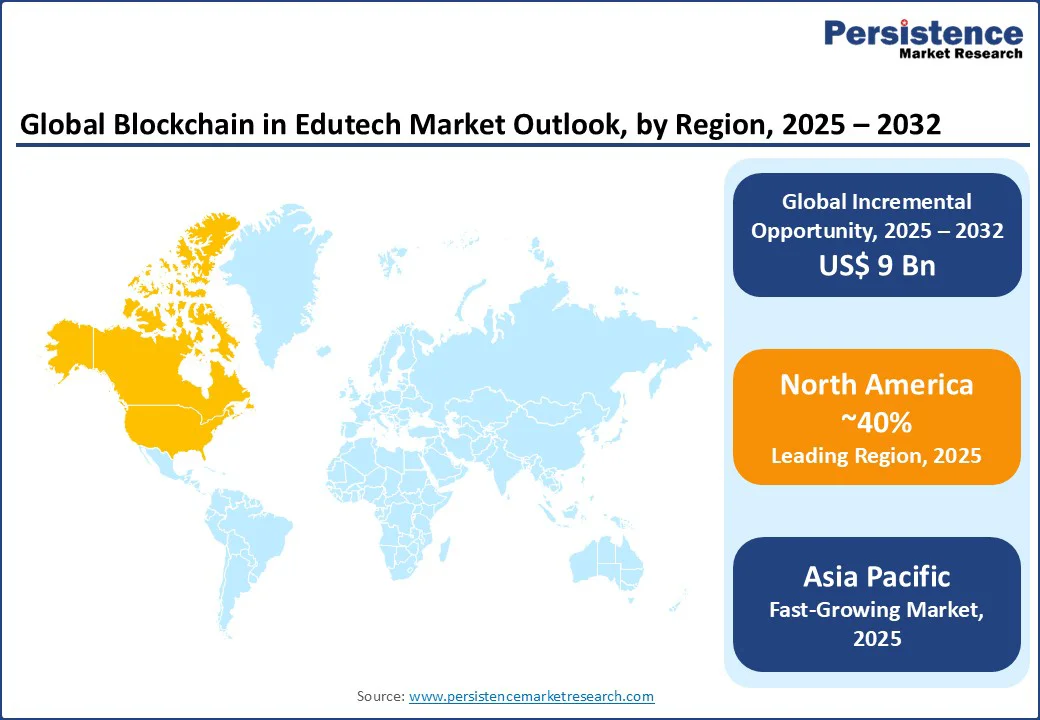ID: PMRREP32429| 193 Pages | 24 Sep 2025 | Format: PDF, Excel, PPT* | IT and Telecommunication

The global blockchain in edutech market size is likely to be valued at US$ 2.4 Bn in 2025 and is expected to reach US$ 11.4 Bn by 2032, growing at a CAGR of 24.9% during the forecast period from 2025 to 2032. The blockchain in edutech market has witnessed substantial growth, driven by the increasing adoption of digital education technologies, rising consumer demand for secure and transparent credential management, and advancements in blockchain integration with learning platforms.
The demand for blockchain solutions that enhance data security, credential verification, and decentralized learning, particularly in higher education and K-12 applications, has significantly boosted market expansion. The growing trend of online education and the need for tamper-proof records and efficient administrative processes are further propelling market growth.
Key Industry Highlights:

| Key Insights | Details |
|---|---|
|
Blockchain In Edutech Market (2025E) |
US$2.4 Bn |
|
Market Value Forecast (2032F) |
US$11.4 Bn |
|
Projected Growth (CAGR 2025 to 2032) |
24.9% |
|
Historical Market Growth (CAGR 2019 to 2024) |
22.8% |
The blockchain in EdTech market is primarily driven by the increasing need for transparency and security in education. Schools, universities, and vocational training centers are managing large volumes of sensitive information, including student records, transcripts, certificates, and financial data. Conventional systems are often vulnerable to breaches, unauthorized access, and fraudulent credentials, threatening the integrity of educational processes. For instance, Dr. APJ Abdul Kalam Technical University (AKTU) in Lucknow, India, implemented blockchain technology during its convocation on September 9, 2025, awarding around 50,000 degrees to engineering and management graduates. This initiative was designed to improve the security, efficiency, and transparency of credential verification. By leveraging a decentralized, tamper-proof system, AKTU streamlined the storage and authentication of academic records, benefiting students, institutions, and employers.
Blockchain technology mitigates these risks through a decentralized and immutable ledger, ensuring that records are secure, verifiable, and tamper-proof. This builds trust among students, educators, and employers, as credentials can be authenticated efficiently and reliably. With the rise of online learning and remote education, the risk of data manipulation has intensified, making secure solutions increasingly critical. Furthermore, regulatory requirements for data privacy are encouraging institutions to adopt blockchain for transparent, secure, and auditable educational records, enhancing credibility and operational efficiency across the education sector.
The blockchain in EdTech market has high implementation costs and technical complexity associated with adopting blockchain solutions. Developing and integrating blockchain platforms requires substantial financial investment, including costs for infrastructure, software development, and skilled personnel. Many educational institutions, especially smaller schools and vocational centers, may lack the necessary budgets and resources to implement these advanced systems.
Blockchain technology involves complex protocols and cryptographic processes that demand technical expertise, which may not be readily available within traditional educational IT teams. This complexity can lead to longer deployment times and increased maintenance requirements. Beyond initial implementation, institutions must also invest in ongoing training for staff, system upgrades, and cybersecurity measures to ensure the integrity of the blockchain network. Moreover, interoperability challenges with existing legacy systems can further complicate adoption, slowing down operational efficiency. These factors collectively make blockchain implementation a costly and technically demanding initiative, which can hinder widespread adoption despite its benefits of enhanced security, transparency, and data integrity in educational processes. For instance, EduChain, a blockchain-based education data management system, was developed to address issues such as diploma counterfeiting and the high cost of certificate authentication. While it offers enhanced security and efficiency, the implementation of such a system requires significant investment in infrastructure and technical expertise, which can be a barrier for many institutions. EduChain involved integrating both private and consortium blockchains and implementing robust mechanisms for database consistency checks and error tracing, demonstrating the technical complexity involved in deploying blockchain solutions in education.
The blockchain in EdTech market is the development of decentralized learning platforms. Traditional online learning systems are typically centralized, meaning that content, user data, and administrative controls are managed by a single organization or server. This centralization can lead to limitations in accessibility, data ownership, and transparency, and may create bottlenecks in credential verification. Decentralized learning platforms leverage blockchain technology to distribute control across multiple nodes, enabling secure, transparent, and tamper-proof management of educational content and student credentials. Such platforms allow students to own their learning data, share verified credentials with employers, and access educational resources without relying on a single authority. Moreover, decentralized platforms facilitate peer-to-peer learning, collaborative content creation, and global access to educational resources, which can enhance inclusivity and engagement. With increasing adoption of online education and the growing demand for personalized learning experiences, blockchain-powered decentralized platforms offer a scalable solution that enhances security, credibility, and operational efficiency. Consequently, educational institutions, EdTech companies, and governments are exploring these platforms as a strategic opportunity to transform the learning ecosystem. For instance, Bittopia is the world's first decentralized university leveraging blockchain technology. It directly connects learners and educators, fostering the creation and sharing of open educational resources, making education more accessible and collaborative.
K-12, commanding nearly 28.8% market share, is driven by the rapid adoption of digital learning platforms, integration of blockchain-based credentials, secure management of student records, streamlined verification processes, and enhanced transparency, data integrity, and trust across educational institutions and stakeholders.
Higher education is the fastest-growing segment, driven by widespread adoption of blockchain in universities and colleges. Features such as secure credential verification, academic record management, and student data privacy enhance institutional efficiency and trust. Students and employers increasingly favor tamper-proof diplomas and real-time transcript sharing, boosting market expansion across digital learning platforms and blockchain-based education solutions.
Record Keeping, contributing over 34% of market revenue, is driven by the growing need for secure, transparent, and tamper-proof management of academic and institutional records, ensuring data integrity, streamlined administration, and trusted verification of student credentials and institutional documentation.
The decentralization of the institutions segment is the fastest-growing, fueled by rising demand in edutech for peer-to-peer platforms. These applications, embedded with smart contracts to automate governance and resource sharing, are increasingly used in open education networks. The global shift toward decentralized models is driving demand for such applications, particularly in Europe and the Asia Pacific.

North America, holding a significant 40% share of the higher education blockchain market, emerges as a key growth region due to multiple strategic and technological factors. The region benefits from early adoption of blockchain technology by leading universities and educational institutions, which recognize the value of secure, transparent, and tamper-proof management of academic credentials and records. Substantial investments in research and development further accelerate innovation, enabling the deployment of advanced platforms for credential verification, transcript management, and digital diplomas. These initiatives not only streamline administrative processes but also enhance trust among students, employers, and academic institutions.
North American institutions increasingly prioritize data privacy and cybersecurity, creating a favorable environment for blockchain-based solutions. Partnerships between educational organizations and technology providers, such as IBM and Coursera, facilitate the integration of blockchain into learning management systems, ensuring real-time sharing and verification of academic records. Combined with a highly digital-savvy population and supportive regulatory frameworks, these factors collectively drive the region’s leadership position, reinforcing North America as a hub for blockchain adoption in higher education and setting benchmarks for global market expansion.
Europe is a significant player in the blockchain in EdTech market, driven by strong institutional support, technological innovation, and increasing demand for secure educational solutions. Leading countries such as Germany, France, and the UK are at the forefront of adoption, supported by substantial investments in blockchain research and development through initiatives such as the EU’s Horizon Europe program. Companies, including SAP and OpenClassrooms, are developing advanced applications for e-transcripts, decentralized credential management, and corporate training solutions, enhancing transparency and efficiency in educational institutions. Germany’s emphasis on Industry 4.0 and digital manufacturing encourages the integration of blockchain technologies within higher education and professional training programs, while France focuses on secure record-keeping and copyright protection to safeguard academic content.
The UK prioritizes data sovereignty, leveraging policies such as the Digital Economy Strategy to accelerate blockchain adoption across universities and vocational institutions. Additionally, Europe’s expanding higher education sector and growing international student population drive demand for reliable, tamper-proof credentials. These combined factors, technological advancement, policy support, and institutional adoption, position Europe as a key growth region for blockchain in EdTech, ensuring steady market expansion and fostering innovation in secure educational services.
Asia Pacific is emerging as the fastest-growing market for blockchain in EdTech, driven by a combination of technological advancement, increasing investments, and rising demand for secure and efficient educational solutions. Rapid digitalization across the region has transformed the learning landscape, with universities, vocational institutions, and online education providers increasingly integrating digital platforms to enhance teaching, administration, and student engagement. Significant investments in EdTech infrastructure, from smart classrooms to cloud-based learning management systems, have created an environment conducive to the adoption of blockchain technology.
Educational institutions are leveraging blockchain for secure credential verification, tamper-proof e-transcripts, and decentralized learning solutions, which improve transparency, reduce fraud, and facilitate seamless sharing of academic records with employers and international institutions. Countries such as China, India, Japan, and Australia are at the forefront of this adoption, supported by government initiatives promoting digital education and innovation. Additionally, the region’s growing student population, increasing internet penetration, and rising awareness of data privacy and security further fuel demand. These factors collectively position Asia Pacific as a high-potential market, enabling sustained growth for blockchain-based solutions in higher education, corporate training, and online learning platforms, while fostering innovation in secure and decentralized educational services.

The global blockchain in EdTech market is highly competitive, with a mix of multinational technology leaders and regional education-focused players. In North America and Europe, companies such as IBM, Coursera, SAP, and Parchment dominate through extensive product offerings, secure credential platforms, and innovations in e-transcripts and decentralized learning solutions. In the Asia Pacific, where digitalization and EdTech adoption are rapidly increasing, players such as BitDegree, Udacity, and EdX are leveraging localized strategies, partnerships, and blockchain-integrated learning tokens to expand market presence. Competition is driven by technological innovation, platform decentralization, and secure record-keeping solutions. Companies such as IBM are launching blockchain-based credential verification platforms, while Coursera focuses on copyright protection for course materials. Regional players are targeting niche education segments with user-centric platforms and AI-blockchain hybrid solutions. Leading players are investing in R&D, strategic alliances, and platform integrations to capture evolving institutional and learner demands. While multinational technology leaders dominate enterprise-level adoption, smaller and regional platforms continue to serve specialized education and vocational markets, creating a fragmented yet dynamic blockchain in EdTech landscape.
The global blockchain in edutech market is projected to reach US$ 2.4 Bn in 2025.
The increasing adoption of digital education technologies is a key driver.
The blockchain in edutech market is poised to witness a CAGR of 24.9% from 2025 to 2032.
Development of decentralized learning platforms is a key opportunity.
OpenClassrooms, Udacity, BitDegree, Parcel, SAP, Parchment, Zynga, Mintable, Blockchain Education Network, Skillshare, IBM, Coursera, EdX, and Instructure are key players.
|
Report Attribute |
Details |
|
Historical Data/Actuals |
2019 - 2024 |
|
Forecast Period |
2025 - 2032 |
|
Market Analysis |
Value: US$ Bn Volume: As Applicable |
|
Geographical Coverage |
|
|
Segmental Coverage |
|
|
Competitive Analysis |
|
|
Report Highlights |
|
By Sector
By Application
By Region
Delivery Timelines
For more information on this report and its delivery timelines please get in touch with our sales team.
About Author